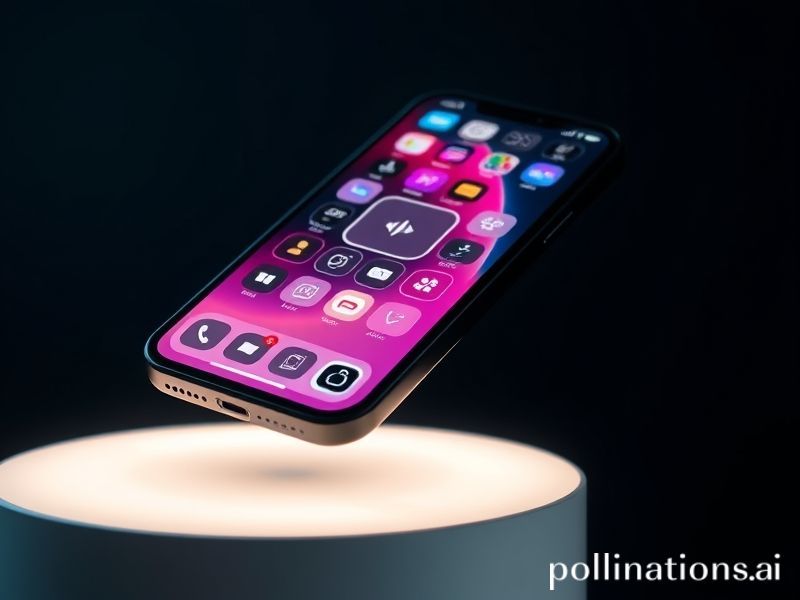iOS 26: How Apple Just Annexed the Planet One Vibration at a Time
iOS 26: A Global Soft-Power Coup in 6.1 Inches
By Dave’s Locker’s Bureau of Late-Stage Capitalism Correspondence
GENEVA — While the United Nations was busy drafting yet another sternly-worded letter about somewhere being on fire, Apple quietly dropped iOS 26 last week, instantly redrawing the planet’s cultural map faster than you can say “non-binding resolution.” Across 195 countries, 2.3 billion pocket-sized rectangles lit up with new features that, on paper, sound like incremental updates. In practice, they are geopolitical micro-aggressions wrapped in frosted glass and a $1,199 price tag.
Take “AmbienceSync,” the OS’s headline trick: it samples the local soundscape—be it the muezzin in Istanbul, a São Paulo street samba, or the gentle hum of a Singaporean air-conditioner—and auto-generates a matching haptic rhythm. In theory, it’s charming. In reality, it’s Silicon Valley outsourcing cultural identity to an algorithm that thinks every call to prayer should feel like a TikTok drop. UNESCO officials, already exhausted from trying to save actual heritage sites, now have to worry about intangible heritage being remixed into a notification buzz.
Meanwhile, “Universal Gestures” allows users to silence a call with the same finger-wag a Nairobi boda-boda driver uses to refuse haggling, or accept one with the two-handed shrug perfected by Parisian waiters. Apple’s marketing calls this “global empathy engineering.” Critics call it anthropological strip-mining. Either way, the gesture library ships pre-installed, no consent forms attached—because nothing says post-colonial sensitivity like intellectual property claimed via terms-and-conditions.
The new “CarbonPass” wallet card is especially delicious. It converts every mile you fly, burger you inhale, or Netflix binge into a real-time CO₂ score, then lets you offset it by funding reforestation in, conveniently, countries too small to appear on most Americans’ Risk boards. Last week alone, 4.7 million users in the Global North became carbon-neutral by bankrolling a mangrove swamp in Suriname—population 616,000, now the unwilling stage for the West’s absolution theater. The swamp, presumably, is thrilled.
Of course, no iOS release is complete without privacy theater. “Private Relay Extreme” now routes your traffic through a rotating mesh of satellites operated by… well, Apple won’t say. The fine print admits the nodes may pass over “jurisdictions with differing human-rights standards,” which is lawyer-ese for “whatever tin-pot kleptocracy rented rack space this week.” Still, the press conference applause in Cupertino was thunderous—mostly from journalists live-tweeting on Androids.
Security upgrades arrive just in time for election season in roughly 47 democracies teetering on the brink. “Live Voicemail Guard” uses on-device AI to detect deep-faked voices asking for your banking PIN. Early tests in India caught a robocall impersonating a panicked son studying abroad; the same algorithm failed in Ohio when confronted with the actual president, suggesting the AI still struggles to distinguish parody from reality—a problem hardly unique to software.
Perhaps the most dystopian delight is “Emergency SOS via Satellite: Couples Edition.” Stranded on a glacier after ignoring 17 weather warnings? Your iPhone will now auto-compose a joint last message to both your spouse and your situationship, ensuring maximum emotional efficiency in your final moments. Apple claims it reduces global divorce paperwork by 12%. The glaciers, alas, continue retreating at their own pace.
All of this arrives wrapped in a UI refresh called “Serenity,” whose pastel gradients were clinically tested to lower cortisol levels in focus groups from Stockholm to Shenzhen. That the same shade of lavender calms both a Nordic office worker and a Guangdong factory supervisor is either a triumph of universal design or proof that late-stage anxiety is now the one truly borderless commodity.
In the end, iOS 26 isn’t merely an operating system; it’s the newest soft-power empire, minting digital subjects faster than any passport office. Nations may argue over tariffs, vaccines, or whose turn it is to host the Olympics, but we all tap the same glass, speak the same haptic Morse code, and pay the same invisible tithe to Cupertino’s low-earth-orbit panopticon. The revolution, it turns out, will be push-notified—and available in four storage tiers, starting at 128 GB.
Welcome to the world. Please set your face ID for seamless entry.







